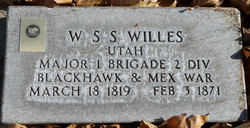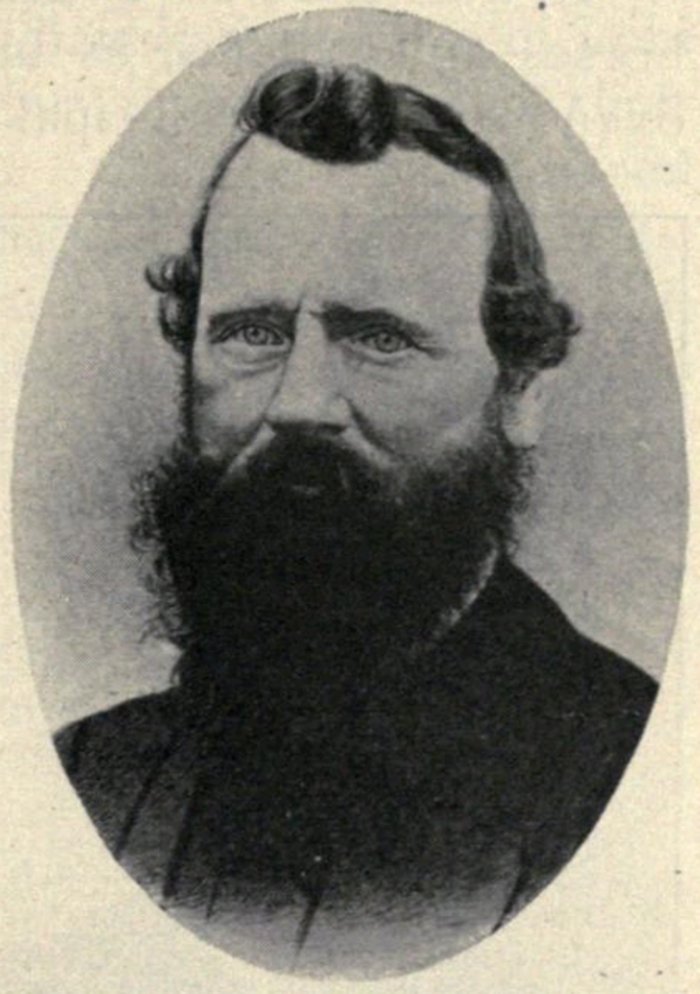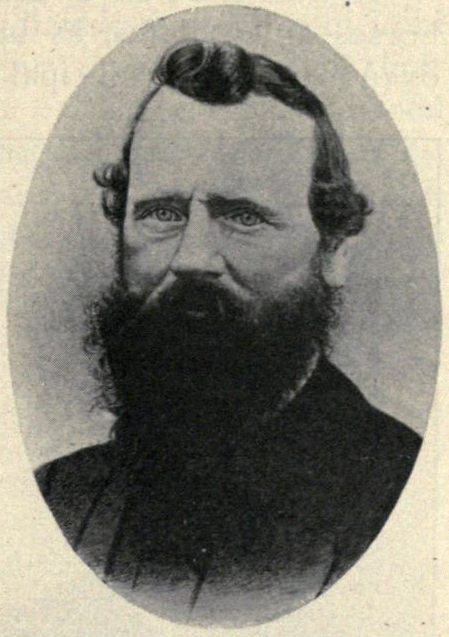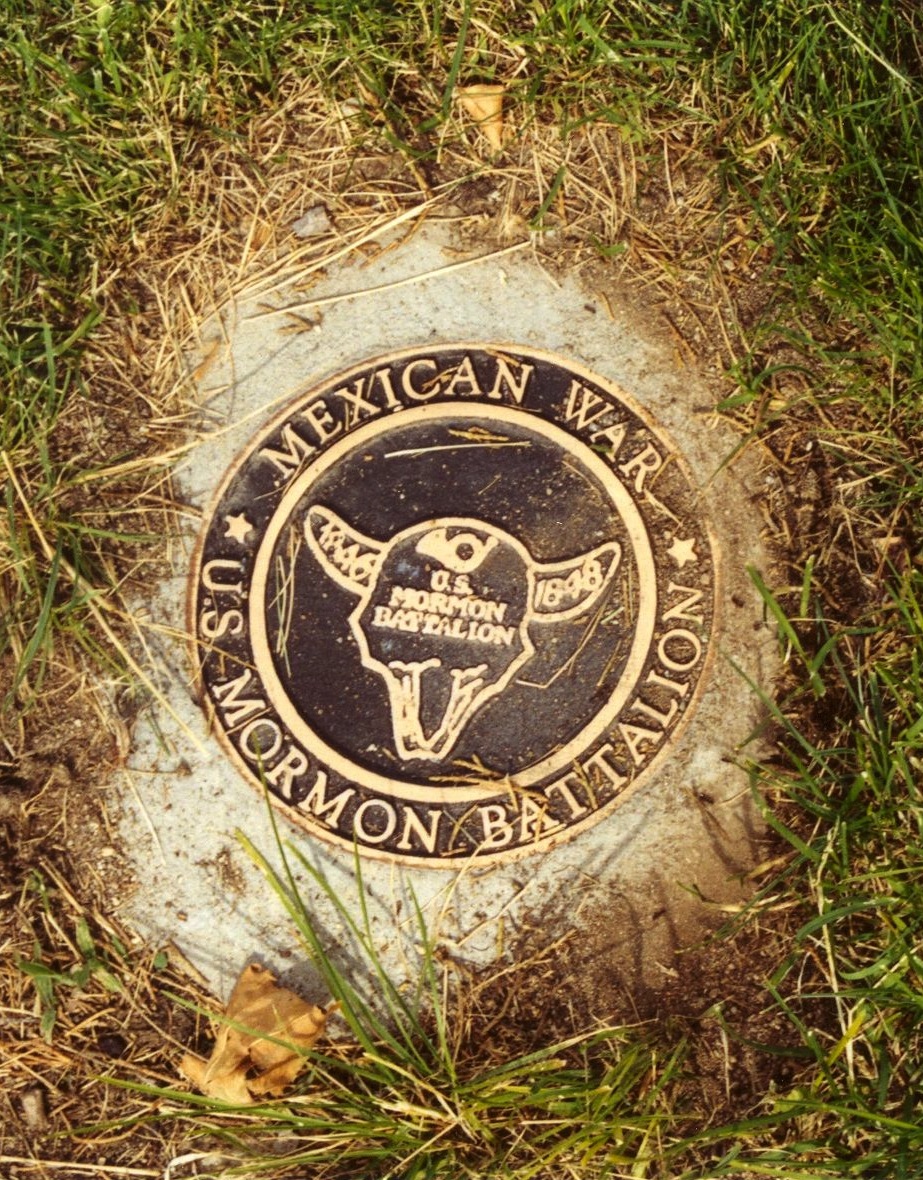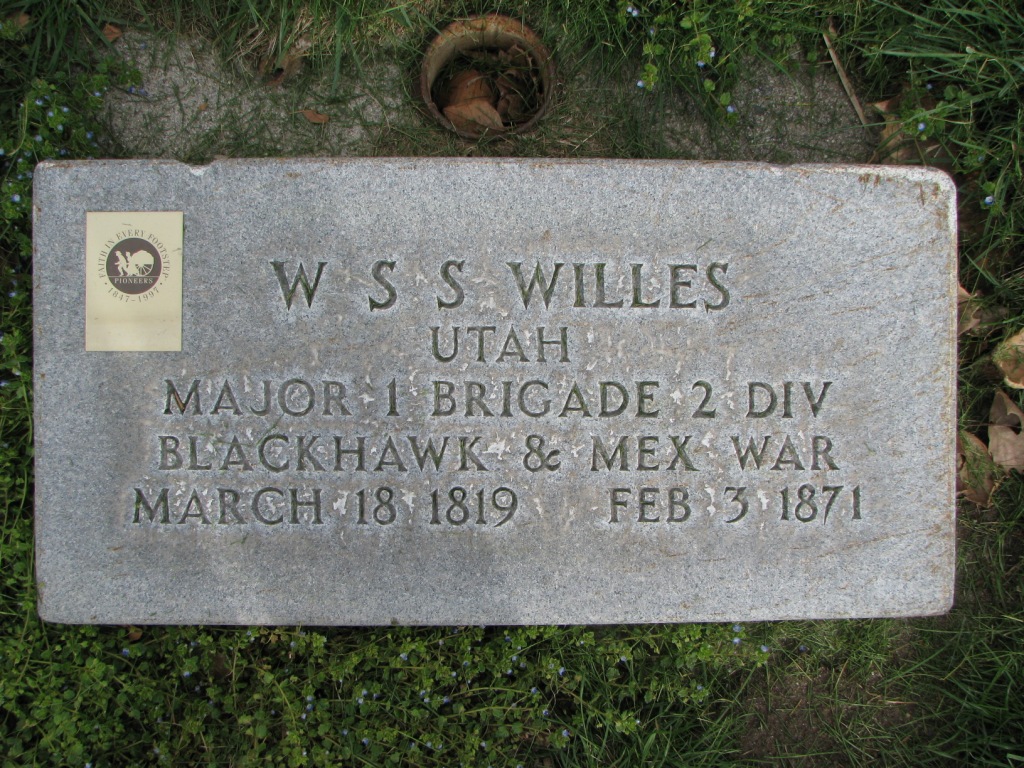Married Docia Emmerine Molen, 15 Feb 1857, later divorced
Married Lucinda Alzina Lott, 23 Apr 1852, Lehi, Utah, Utah
LDS Biographical Encyclopedia, Andrew Jenson, Vol. 3, p. 566
Willes, William Sidney Smith, a member of the Mormon Battalion, was born March 18, 1819, in Jefferson county, New York, the son of Eleazer Willes and Achsah Jones. He was the sixth child of a family of seven children (five sons and two daughters). His ancestors in the direct line emigrated from England to New England prior to the Revolutionary war.
He and his brother, Ira, were the only ones of his father's family who joined the Church of Jesus Christ of Latter-day Saints. William was baptized July 16, 1846, by Parley P. Pratt. They were with the Saints when the call was made upon the Church for a battalion of men to go and fight in the war with Mexico. They volunteered and were mustered as privates in Company B of the Mormon Battalion and made the long and perilous journey overland to California. Arriving in California, Sidney, as he was commonly called, secured work at Sutter's Mill at the time that gold was first found there. Later, he dug gold at Mormon Island with the "Mormon" boys. A great deal has been said among his friends to the effect that he was actually the first discoverer of gold, instead of James W. Marshal. The facts as related by him are as follows: He found some particles of yellow metal and suspected their true character, but decided to say nothing until he could verify his suspicions, thinking he would put them to the test after his day's work was ended. In the meantime Marshal had also found some of the same metal and confided his belief that it was gold to Henry W. Bigler and others, and thus the great discovery was made known to the world. Being urged, at different times, by his friends to press his claim to the honor of being the first discoverer of gold in California, he invariably answered: "What matters who the discoverer was, just so that the gold was discovered." He made the scales on which the first gold was weighed in California.
In 1852 (April 23d) he married Alzina L. Lott, daughter of Cornelius P. and Permelia Darrow Lott, in Lehi, Utah, Brigham Young performing the ceremony. They established their home in Lehi, where were born to them nine children, two sons and seven daughters, and their house was the first one in Lehi with a board floor. With the assistance of a hired man, Bro. Willes sawed the lumber with a pit saw, first taking off a slab which he used for the roof; next, a board for the floor, while the balance of the log was used in the construction of the walls with the sawed side inside.
March 10, 1855, he was commissioned, under the hand of Governor Brigham Young, captain of Company A, Lehi Post, of Utah Military District of the Nauvoo Legion (Utah Militia), having been elected to this office May 11, 1854. On the organization of the 68th quorum of Seventy, Nov. 28, 1862, he was appointed one of its presidents.
In 1863 he was called on a mission to England and assigned to labor in the Norwich district; he was absent nearly three years. Returning home in the fall of 1865, he was captain of an ox-train which brought a company of immigrating Saints across the plains, and arrived in Salt Lake City Nov. 29, 1865.
In December, 1866, he was elected major of the Second Regiment, First Brigade, Second Division, Nauvoo Legion (Utah Militia ). His commission was issued by Governor Durkee March 27, 1868. He participated in the various Indian wars of the Territory, except the Black Hawk war, being absent in England during the greater part of this war. He took part in the so-called Echo Canyon war in 1857, and was captain of a company which, in 1858, left Lehi to go to the relief of settlers on Salmon River.
He brought the first bees to Lehi, consisting of three hives, one for himself and one each for two other men. He was several times elected to the city council of Lehi. Although his opportunities for an education were meager he was an ardent supporter of education. Bro. Willes was a man well adapted to pioneer a new country, because he was able to turn his hand to almost any line of work, being an excellent gunsmith, carpenter, machinist, etc. In fact, he was what is generally called a natural born genius. He surveyed the Spring Creek ditch in Lehi from the old mill pond to the lower field and, not having a spirit level, he made one out of a piece of wood with a groove cut in the top which he filled with water. This incident shows his aptitude in contriving things to meet an emergency. He made jewelry for his daughters from the gold which he brought from California, and he could repair any kind of machine from a clock to a steam engine. Bro. Willes was noted for his kindness of heart, cheerfulness, generosity, bravery and coolness in times of great danger. These qualities won for him the respect and love of all who knew him. He was of a modest, retiring disposition, never caring for prominence or position among men; yet his strict integrity, mature wisdom, and large experience placed him in the front ranks among his associates.
In the winter of 1870-1871, while working as a sawyer at a mill in American Fork Canyon, he was caught in the saw, which resulted in injuries from which he died Feb. 3, 1871, cutting short a useful career in the fifty-second year of his age.
Married Docia Emmerine Molen, 15 Feb 1857, later divorced
Married Lucinda Alzina Lott, 23 Apr 1852, Lehi, Utah, Utah
LDS Biographical Encyclopedia, Andrew Jenson, Vol. 3, p. 566
Willes, William Sidney Smith, a member of the Mormon Battalion, was born March 18, 1819, in Jefferson county, New York, the son of Eleazer Willes and Achsah Jones. He was the sixth child of a family of seven children (five sons and two daughters). His ancestors in the direct line emigrated from England to New England prior to the Revolutionary war.
He and his brother, Ira, were the only ones of his father's family who joined the Church of Jesus Christ of Latter-day Saints. William was baptized July 16, 1846, by Parley P. Pratt. They were with the Saints when the call was made upon the Church for a battalion of men to go and fight in the war with Mexico. They volunteered and were mustered as privates in Company B of the Mormon Battalion and made the long and perilous journey overland to California. Arriving in California, Sidney, as he was commonly called, secured work at Sutter's Mill at the time that gold was first found there. Later, he dug gold at Mormon Island with the "Mormon" boys. A great deal has been said among his friends to the effect that he was actually the first discoverer of gold, instead of James W. Marshal. The facts as related by him are as follows: He found some particles of yellow metal and suspected their true character, but decided to say nothing until he could verify his suspicions, thinking he would put them to the test after his day's work was ended. In the meantime Marshal had also found some of the same metal and confided his belief that it was gold to Henry W. Bigler and others, and thus the great discovery was made known to the world. Being urged, at different times, by his friends to press his claim to the honor of being the first discoverer of gold in California, he invariably answered: "What matters who the discoverer was, just so that the gold was discovered." He made the scales on which the first gold was weighed in California.
In 1852 (April 23d) he married Alzina L. Lott, daughter of Cornelius P. and Permelia Darrow Lott, in Lehi, Utah, Brigham Young performing the ceremony. They established their home in Lehi, where were born to them nine children, two sons and seven daughters, and their house was the first one in Lehi with a board floor. With the assistance of a hired man, Bro. Willes sawed the lumber with a pit saw, first taking off a slab which he used for the roof; next, a board for the floor, while the balance of the log was used in the construction of the walls with the sawed side inside.
March 10, 1855, he was commissioned, under the hand of Governor Brigham Young, captain of Company A, Lehi Post, of Utah Military District of the Nauvoo Legion (Utah Militia), having been elected to this office May 11, 1854. On the organization of the 68th quorum of Seventy, Nov. 28, 1862, he was appointed one of its presidents.
In 1863 he was called on a mission to England and assigned to labor in the Norwich district; he was absent nearly three years. Returning home in the fall of 1865, he was captain of an ox-train which brought a company of immigrating Saints across the plains, and arrived in Salt Lake City Nov. 29, 1865.
In December, 1866, he was elected major of the Second Regiment, First Brigade, Second Division, Nauvoo Legion (Utah Militia ). His commission was issued by Governor Durkee March 27, 1868. He participated in the various Indian wars of the Territory, except the Black Hawk war, being absent in England during the greater part of this war. He took part in the so-called Echo Canyon war in 1857, and was captain of a company which, in 1858, left Lehi to go to the relief of settlers on Salmon River.
He brought the first bees to Lehi, consisting of three hives, one for himself and one each for two other men. He was several times elected to the city council of Lehi. Although his opportunities for an education were meager he was an ardent supporter of education. Bro. Willes was a man well adapted to pioneer a new country, because he was able to turn his hand to almost any line of work, being an excellent gunsmith, carpenter, machinist, etc. In fact, he was what is generally called a natural born genius. He surveyed the Spring Creek ditch in Lehi from the old mill pond to the lower field and, not having a spirit level, he made one out of a piece of wood with a groove cut in the top which he filled with water. This incident shows his aptitude in contriving things to meet an emergency. He made jewelry for his daughters from the gold which he brought from California, and he could repair any kind of machine from a clock to a steam engine. Bro. Willes was noted for his kindness of heart, cheerfulness, generosity, bravery and coolness in times of great danger. These qualities won for him the respect and love of all who knew him. He was of a modest, retiring disposition, never caring for prominence or position among men; yet his strict integrity, mature wisdom, and large experience placed him in the front ranks among his associates.
In the winter of 1870-1871, while working as a sawyer at a mill in American Fork Canyon, he was caught in the saw, which resulted in injuries from which he died Feb. 3, 1871, cutting short a useful career in the fifty-second year of his age.
Bio by: SMS
Family Members
Advertisement
Advertisement
